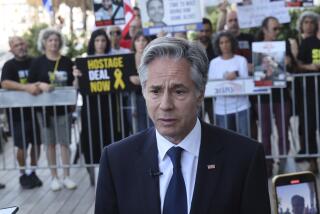U.S. Conditionally OKs Talks With Nicaragua : White House Backs Congress’ Plan but Insists That Contras, Sandinistas Begin the Negotiating
WASHINGTON — The Reagan Administration on Tuesday endorsed a congressional proposal for negotiations with Nicaragua’s leftist government along with a halt in American aid to the contras and Soviet military aid to the Managua regime.
However, a White House spokesman said that the Administration also insists that any negotiations begin with talks between contra representatives and the Sandinista government, a demand that the regime has steadfastly rejected.
“We . . . welcome this initiative as part of our broad support for the ongoing negotiating process in Central America,” presidential spokesman Bob Hall said.
‘Engage in Dialogue’
“We have stated on many occasions that we will resume direct talks with the government of Nicaragua when the Sandinistas engage in a dialogue with representatives of the Nicaraguan democratic resistance,” he said. “. . . Representatives of the resistance must be parties to the negotiations.”
The reference to “representatives” of the contras indicated a possible, slight shift in Administration position. Earlier, the Administration and the contras had asked for direct negotiations between the regime and the rebels, but in the last few months, U.S. and contra officials have said that indirect talks--through unspecified “representatives”--might be acceptable.
The congressional proposal, put forward by Rep. Jim Slattery (D-Kan.) and signed by 110 other members of the House, calls on the Administration to help arrange a 90-day cease-fire between the contras and the Sandinistas.
‘Positive But Conditional’
It says that the cease-fire should be followed by a halt in foreign military aid to both sides, the restoration of civil liberties in Nicaragua, negotiations between the Sandinistas and opposition parties to arrange new elections, and direct negotiations between the Sandinistas and the United States.
The Administration’s measured endorsement of the plan was intended to be “positive but still conditional,” one official said.
There was no immediate response from the Nicaraguan government.
Pressure Tactic
Slattery said his proposal is aimed at pressuring the Administration and the Sandinistas into negotiations before Congress is forced to debate a renewal of U.S. military aid to the contras this fall.
“President Reagan has a window of opportunity in the next few months to try to seek a diplomatic solution in Nicaragua,” he said.
“The clear perception in this country is that the Administration has not aggressively pursued a diplomatic solution. . . . I’m trying to nudge the Administration in the direction of letting the diplomats run the policy.”
Slattery said he believes that the Administration will be forced to change its policy if it hopes to win additional aid for the contras from Congress.
See Need for Aid
Reagan and his aides have argued that a diplomatic solution in Nicaragua is possible only if the contras are given enough military aid to negotiate from a position of strength.
Democrats and moderate Republicans in Congress have complained, on the other hand, that the Administration is concentrating almost entirely on the contra military effort--at the expense of opportunities to negotiate.
Several officials said that the Administration has decided to endorse the Slattery proposal--but largely in an attempt to placate the members of Congress who signed it and whose votes will be needed to win renewed contra aid this fall.
More to Read
Sign up for Essential California
The most important California stories and recommendations in your inbox every morning.
You may occasionally receive promotional content from the Los Angeles Times.











